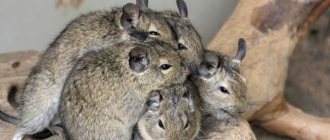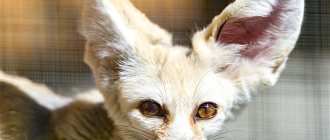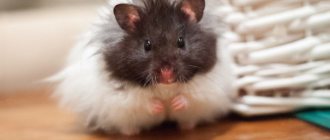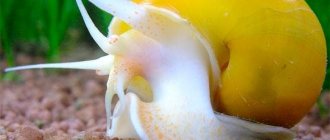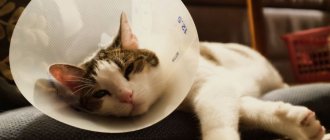"Pros" of having a chinchilla at home
- For busy people whose day is scheduled minute by minute, a chinchilla is the most suitable solution. These babies are quite independent and do not require attention from the owner. You don't have to go for a walk with them. You can let the animal run around the apartment for two to three hours.
- If you are planning a trip, you don’t need to think about who to leave your pet with. Chinchillas can easily live alone for several days. The main thing is to provide it with enough water and food.
- If the owner works mainly during the day, then his schedule coincides with the biological rhythm of the animal. Rodents are nocturnal and are most active in the evening hours. You will have the opportunity to observe this interesting animal.
- Due to the fact that the animal does not have sweat and sebaceous glands, it will not smell bad, even if the owner does not clean the cage in time.
- Chinchillas are soft lumps. Their fur is so pleasant to the touch that once you touch it, you want to touch it again and again.
- Due to the thickness of their fur, chinchillas do not have parasites, and you will never encounter problems such as fleas or ticks.
- The animal's fur is hypoallergenic. Therefore, they can be kept even where there are small children.
- Chinchillas do not shed. A few hairs may fall out. Rodents also shed small pieces of fur under severe stress or during a fight with each other.
- The animal does not need to clean its ears, trim its claws or bathe it in water. Chinchillas take sand baths exclusively, and they take care of personal hygiene on their own.
- This is almost the only representative of rodents in which the period of pregnancy and the baby’s attachment to the mother is quite long. The female carries her baby for four months, and the baby stays near the mother for the same amount of time. In the natural environment, children do not move away from their mother for eight months, following on her heels. Thanks to this, chinchillas have strong immunity and do not have congenital or genetic diseases. Therefore, animals do not need vaccinations. The only cause of an animal's illness can be improper maintenance or care.
- The owner of a chinchilla will not have any problems with housing countless chinchillas. Even if a pair of rodents lives in a cage, the female will bear offspring only once every eight months. There is a maximum of two babies in a litter.
- Due to the fact that chinchillas have almost no enemies in nature, they do not have certain attributes of protection: sharp claws, teeth, thorns. Therefore, the owner of the animal is unlikely to ever be scratched or bitten. Peace-loving animals are able to use their teeth in case of serious danger. Only females, during times of severe stress, can spray the offender with a stream of urine.
- Curious chinchillas easily make contact. Having got used to the owner, they allow themselves to be picked up and played. It is especially interesting to watch the kids splashing in the sand baths.
- A chinchilla does not require any special expenses. All she needs is a cage, sawdust and food. The animal eats about two tablespoons of food per day.
- If you have a small apartment, then this animal will fit perfectly into the interior. The rodent's cage does not take up much space, since it should be high, not wide. Cleaning your chinchilla's home is very easy.
- The lifespan of fluffies is quite long. If you follow all the rules for caring for them, the animals will delight the owner for 15–18 years.
Does a chinchilla bite?
Is it worth getting a chinchilla?
Like any other animal, the chinchilla has its own characteristics and maintenance rules. Anyone who wants to keep this rodent at home should think about whether it will receive proper care.
Do chinchillas make noise at night?
Historically, chinchillas have been active at night. That's what they call them - twilight animals. When choosing a pet, it is worth considering the fact that its activity will increase in the evening. But during the day he will happily rest. This happens more often in young individuals. Older ones who have offspring are calmer.
IMPORTANT! If you try to wake up the animal during the day and not let it sleep, it will be stressed and get sick more often. Therefore, you should not forcibly interrupt his rest.
Does the animal have an unpleasant odor?
Almost all pets have one or another smell that is unusual for us. When you enter any apartment, you can immediately tell by the smell whether someone lives here or not. Chinchilla, perhaps, will be an exception here. The animal itself does not have an unpleasant odor. Chinchilla is very clean. And if the owner himself cleans the cage on time, changes the bedding, and monitors the freshness of the food and water, then the problem of odors will not interfere. Otherwise, odors will be absorbed into the animal's fur.
REFERENCE. To avoid odors, sometimes you need to give your pet sand baths.
A person may be allergic to chinchillas
Is it possible to be allergic to a pet?
Chinchilla fur causes allergies no more often than the fur of any other animal. Therefore, if a person is predisposed to allergies, then it is better to go to the store, hold this animal in your hands for a while and see how the body reacts.
It happens that because of living in the house of a rodent, people become more sensitive. Before getting rid of your beloved pet, you should purchase an air purifier and carry out wet cleaning more often.
Preventive measures will help prevent the occurrence of an allergic reaction:
- when cleaning the cage, it is better to use a protective mask to avoid dust from fur and filler entering the body;
- Wipe the cage and everything in it more often with a damp cloth or rag.
- it is recommended to replace store-bought filler with regular sawdust;
- bathe the animal in a room where there is good ventilation.
How dangerous are chinchillas?
May cause allergies.
They can infect skin lichen.
They can carry various infections.
It is necessary to maintain cage hygiene, wash your hands after interacting with your pet, and give the animal sand baths more often.
IMPORTANT! Chinchillas rarely get parasitic diseases and do not transmit rabies through bites.
Is it possible for families with children to have a chinchilla?
It is important to understand that any pet is a living creature. Therefore, children should know that they must handle the animal with care. These rodents do not like to be cuddled or pressed hard. The chinchilla may be scared or in pain. She may bite in self-defense.
If the child is very small and, due to his age, is not yet able to understand such things, then it is better to avoid contact with the rodent. If the child just likes to watch animals and will not disturb the pet’s peace, then the child will not become an obstacle to buying a rodent. Only under these conditions can an animal live happily ever after in a family.
Will other pets be a problem?
These rodents spend most of their time in a house, in a cage. But sometimes the owners let them go for a walk. If supervision is carried out, then no special problems should arise. Chinchilla gets along well with other types of rodents: rabbits, guinea pigs, hamsters.
With the most commonly encountered animals, dogs and cats, chinchillas usually maintain a friendly neutrality. If the dog breed is not aggressive, then the animals can even be friends. But conflict situations are also possible. The owner should be more careful.
Remember that with any neighbor, division of territory is inevitable. The opponent will cause constant stress to your new pet. If animals living in the house walk outside, they can bring infection or pathogenic bacteria to the rodent. But if you place smaller relatives, for example, small mice, in a chinchilla’s cage, then in this case you should fear for their lives.
Do you have other animals in the house that roam outside?
Chinchillas have their pros and cons
“Disadvantages” of keeping a chinchilla in an apartment
- You need to be prepared for the fact that chinchillas are nocturnal. Therefore, it is better not to place a cage with a pet in a room intended for sleeping, otherwise you will not fall asleep from the noise made by the pet.
- At home, a chinchilla needs a spacious cage, as it is a fairly active animal. You need to choose a high cage so that the animal can jump freely on it.
- Another drawback: due to sand bathing, the owner will have to frequently clean the area around the cage.
- A chinchilla should only be allowed out for walks under close supervision. If you don't keep an eye on the beast, you can end up with chewed furniture or torn wallpaper.
- Animals are afraid of loud sounds and sudden movements. You need to be especially quiet during their sleep - during the day.
- Not all animals love to be held. Some babies take a long time to get used to their owner.
- Chinchillas cannot tolerate heat, so in the summer it is important to provide the animal with comfortable conditions. It is also necessary to ensure that there are no sudden temperature changes.
Choosing a water bowl for chinchillas.
Care and maintenance at home
Having a chinchilla at home is a real pleasure. It does not take up much space in the home and is quite unpretentious. Further in the article you will be able to familiarize yourself in detail with the conditions of keeping and rules for caring for your pet.
Did you know? Chinchillas are quite well oriented in space, but at the same time they have poor eyesight. A developed sense of smell helps them move.
Conditions of detention
In order for an animal to develop normally, be healthy, and feel comfortable in an apartment or house, it is necessary to create special conditions for it.
To do this, you must comply with the following requirements:
- the cage should be kept away from heating devices and batteries;
- the room temperature should be +22°C;
- drafts should not be allowed in the room where the cage is located;
- the house must be placed away from windows, since the animal does not like contact with direct sunlight;
- indoor air humidity indicators should fluctuate between 50–60%.
Choosing and arranging a home
Chinchillas often prefer to retire, so you need to purchase a small house for the animal. Today in specialized stores you can see a wide range of zoological products.
Did you know? Chinchillas hold the record for the density of fur among all other animals.
In the process of arranging a home for a rodent, you need to take care of the following:
- A high-quality drinking bowl and feeder should be installed in the cage or house. The containers must be well attached, since the chinchilla can easily knock them over with his paws.
- Since a furry pet is a playful animal, you need to create an entertainment area for it. Various wooden sticks, ladders, a running wheel, toys and rings will be very interesting to the animal and will not let him get bored. When choosing related equipment, give preference to products made from birch wood.
- Rodents have a natural need to grind down their teeth, so mineral and salt stones should be placed in their home. With their help, the pet will satisfy its natural needs and fill its body with useful minerals and vitamins.
What to feed and drink
The choice of food for a chinchilla must be taken very carefully and seriously. The health and appearance of the animal depends on this. The animals are herbivorous rodents.
Also find out why a chinchilla might bite and what to do about it.
Their diet should consist of:
- hay can be produced independently (this type of feed is prepared from plants such as alfalfa, dandelion and clover);
- fresh strawberry, nettle and dandelion leaves;
- dry granulated food, which is sold in pet stores specifically for rodents;
- branches of currant, apple, linden, raspberry, willow and birch;
- corn grains;
- flax seeds (they must be of good quality - whole and unripe);
- fresh pieces of hard fruits and vegetables (apples, pears and carrots).
Chinchillas love water very much, since their main food is dry food. The need to drink fluids occurs quite often. The water must be clean and boiled. Make sure it never runs out in the drinking bowl. The drinking container must be washed and its contents changed once a day.
Read more about how to feed a chinchilla at home.
Fur care and cleaning
An integral part of care is regular cleaning of chinchillas’ homes. This must be done at least once a week. All parts of the house or cage should be thoroughly wiped and the bedding should be changed. Special attention must be paid to the cleanliness of the feeder and drinking bowl. It is in these containers that the largest number of bacteria accumulate.
Surfaces should be regularly washed with soapy water, then thoroughly rinsed with running water and wiped with a dry, clean towel. An equally important aspect of caring for a rodent is inspecting its coat. Once a week, the chinchilla needs to be combed well. Clumps of matted fur should be carefully cut out with scissors.
Important! Animals do not like the process of combing because they feel discomfort. The manipulation must be performed very carefully so as not to cause pain to the pet.
Reviews from chinchilla owners
Oleg, Stavropol
“I have a male chinchilla. He's been living with us for six months now. An adult, but he doesn’t want to be held. Sometimes he climbs onto my shoulders and walks all over me, and if you stretch out your hand, he immediately runs into the cage. In the evening he walks for three hours, then you have to catch him with a blanket, since you can’t leave him unattended. There is no unpleasant smell at all. He eats little. He loves peanuts and dried apples. Basically a great pet. One minus is that it is noisy at night.”
Ekaterina, Vologda
“Chinchilla is my soft treasure. Very cute animal, absolutely no strong or unpleasant odors. An unpretentious animal in care and communication. It is easy to care for. Animals require patience from the owner during training.
How much does a chinchilla cost?
We brought a chinchilla into our house about two years ago. I have long dreamed of an exotic animal. This rodent was chosen for its unpretentiousness, hypoallergenicity and longevity. In addition, he calmly stays at home alone, which also played a decisive role in choosing a pet.”
Keeping chinchillas as a pet can give you a lot of positive emotions. If you are not afraid of minor “cons” in their behavior, then you can safely buy yourself a small rodent. The positive emotions that a pet will give every day can cover all existing shortcomings.
Character and life expectancy
Compared to other rodents, chinchillas live much longer at home. If you create comfort for the animal, take care of its health, and properly prepare its diet, it will live 20-25 years. By nature, pets are calm and do not tend to show aggression. They make contact with the hunt and show curiosity about everything that happens around them. They will be happy to examine everything that the owner or hostess is wearing. They are interested in every button and bead, earrings, hairpins. The owner's shoulders or head are often chosen as their favorite place. As long as he sits on the sofa, the pet will sit on his head and also watch TV.
However, there is no need to relax. Pets have different personalities. It is possible that you will come across someone who is harmful and withdrawn, preferring loneliness. This one might bite if you try to get it out of the cage. Re-educating an adult animal will not be easy. It will take time and patience, but in the end you can get a faithful and devoted friend.
